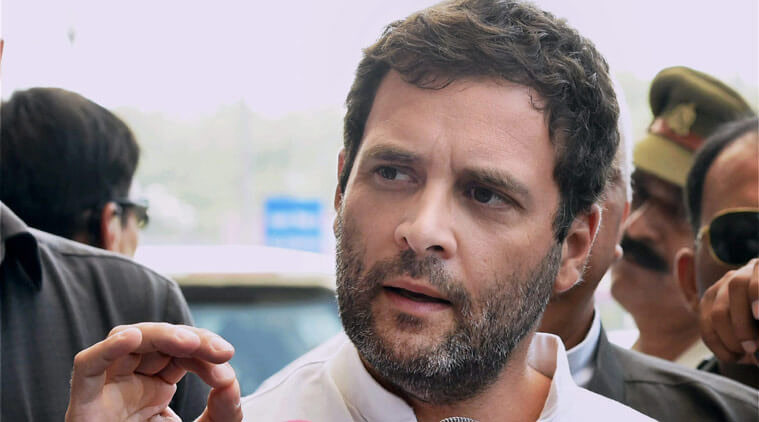Stay updated with the latest - Click here to follow us on Instagram
Lalit Modi row: Congress leads Opp boycott of all-party meet; PM Modi tells MPs world watching
Rahul Gandhi also attacked Prime Minister Narendra Modi over his 'silence' on the row and said 'people of India are losing their faith in him'.
 Rahul Gandhi also attacked Prime Minister Narendra Modi over his ‘silence’ on the row and said ‘people of India are losing their faith in him’.
Rahul Gandhi also attacked Prime Minister Narendra Modi over his ‘silence’ on the row and said ‘people of India are losing their faith in him’.
On the day his party led an Opposition boycott of an all-party meeting called by Leader of the House in Rajya Sabha Arun Jaitley and paralysed Parliament for the third day, Congress vice-president Rahul Gandhi upped the ante, saying External Affairs Minister Sushma Swaraj had committed “a criminal act” by “helping” former IPL chief Lalit Modi and should “go to jail”.
He also attacked Prime Minister Narendra Modi over his “silence” on the row and said “people of India are losing their faith in him”.
[related-post]
Speaking to reporters outside Parliament Thursday, Rahul said: “She is a minister of the government. The whole country know that she has done a criminal act. When you do a criminal act, you go to jail… She has done a criminal act. The External Affairs Minister of India is going around the government of India and saying please release this man… The Chief Minister of Rajasthan has done that. Here she is helping the gentleman. This is against the law.”
“What we have said is that (there will be) no discussion without resignation. Sushma has committed a criminal act. He (Lalit Modi) is a fugitive. You have signed it (the recommendation for grant of travel document). Our High Commissioner there (London) does not know about it. The Indian government is not aware. Unke parivar ka business hai inke saath (Her family has business ties with him). So when we raise these issues, (Prime Minister) Modi has to respond,” he said.
He said the Prime Minister promised “na khaoonga, na khaane doonga” during the Lok Sabha election campaign. “The Prime Minister’s words should carry weight… Jo bhi dil mein aata hai, woh keh dete hain aur inke credibility aahiste aahiste zameen mein ja rahi hai (he is slowly losing his credibility),” he said.
Referring to the Vyapam scam, he said: “Forty people have been murdered one after another. One of your friends has died… The Prime Minister cannot not speak a word. I am not saying this. The people of the country are saying this.”
“When people voted, they did not vote for Sushma. They voted for Modi because they trusted him. And that trust is fading like a balloon losing air. I am very happy. I am saying he should speak. But I am very happy when he doesn’t speak because I am benefiting,” he said.
In Parliament, the government’s attempt to break the logjam failed with the Congress and other opposition parties in Rajya Sabha deciding not to attend an all-party meeting Jaitley called.
The opposition maintained that any discussion could take place only after the removal of Swaraj, Rajasthan Chief Minister Vasundhara Raje and Madhya Pradesh Chief Minister Shivraj Singh Chouhan in view of the controversies surrounding them.
Once the Congress decided to stay away, sources said others in the opposition followed suit to honour a “request” from the party.
Ghulam Nabi Azad, Leader of Opposition in Rajya Sabha, said: “The meeting was to end the deadlock. But a solution will not emerge from the meeting… We have put forward a demand and most parties in the opposition have given notices on that. Till action is not taken on that demand, what is the point in attending the meeting. A solution will not emerge in the meeting, solution has to be found by their party… So when the Leader of the House, and we have high regard for him, announces that action has been taken, we will start attending meetings.”
Meanwhile, the Prime Minister, reaching out to MPs across parties, called for free airing of views by members on national issues irrespective of party affiliations.
With key reforms stuck because of the stalemate in Parliament, Modi asked MPs to take a larger view of issues “in the global context”.
Speaking at a workshop on the Speaker’s Research Initiative (SRI) to train MPs on subjects of global importance, he said: “When the world looks at India, they observe in great detail all our activities, our decisions, the direction we are headed in.. the kind of decisions we are taking, the kind of impact these will have in the global context… we cannot work in isolation in a globalised world… Decisions need to be taken in the global context. Suddenly, gold prices may fall or there may be a particular situation in Greece. We cannot say that it is happening somewhere else. We have to see the context and assess whether there is impact on us.”







